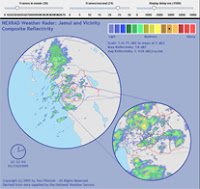Mark Steyn is a wonderful columnist, writing for the London Telegraph and other outlets. His columns often make me laugh right out loud, and always make me think. Today he's posted a column about Bush's upcoming European trip, and why it really doesn't mean anything. As always, it's funny as hell. And the European perspective is interesting to read about. A longish passage from the column:
And now the President himself is on his way, staying up all night on Air Force One trying to master the official State Department briefing paper on the European Rapid Reaction Force, the European Constitution, the European negotiations with Iran, etc. ("When these subjects come up, US policy is to nod politely and try not to giggle. If you feel a massive hoot of derision coming on, duck out to the men's room, but without blaming it on the escargots.") The French Foreign Minister took to calling the US Secretary of State "chère Condi" every 30 seconds. It's doubtful if the French President will go that far, but, if he does, the White House line is that Mr Bush is happy to play Renee Zellweger to Chirac's Tom Cruise ("You had me at bonjour").
What does all this mean? Nothing. In victory, magnanimity – and right now Bush can afford to be magnanimous, even if Europe isn't yet ready to acknowledge his victory. On Thursday, in a discussion of "the greater Middle East", the President remarked that Syria was "out of step". And, amazingly, he's right. Not so long ago, Syria was perfectly in step with the Middle East – it was the archetypal squalid stable Arab dictatorship. Two years on, Syria hasn't changed, but Iraq has, and, to varying degrees, the momentum in Jordan, Egypt, Saudi Arabia, the Palestinian Authority and Lebanon (where the Syrians have overplayed their hand) is also in the Bush direction. Boy Assad finds himself in the position of the unfortunate soldier in Irving Berlin's First World War marching song, "They Were All Out Of Step But Jim".
The EU isn't the Arab League, though for much of the past three years it's been hard to tell the difference. But it, too, is out of step. The question is whether the Europeans are smart enough, like the savvier Sunnis in Iraq, to realise it. The Washington Post's Fred Hiatt compared the President's inaugural speech with Gerhard Schröder's keynote address to the Munich Conference on Security Policy last week and observed that, while both men talked about the Middle East, terrorism and 21st-century security threats, Mr Bush used the word "freedom" 27 times while Herr Schröder uttered it not once; he preferred to emphasise, as if it were still March 2003 and he were Arab League Secretary-General, "stability" – the old realpolitik fetish the Administration has explicitly disavowed. It's not just that the two sides aren't speaking the same language, but that the key phrases of Mr Bush's vocabulary don't seem to exist in Chirac's or Schröder's.
The differences between America and Europe in the 21st century are nothing to do with insensitive swaggering Texas cowboys. Indeed, they're nothing to do with Iraq, Iran, Kyoto, the International Criminal Court, or any other particular issue. They're not tactical differences, they're conceptual.
That last bit is an insight worth pondering.






